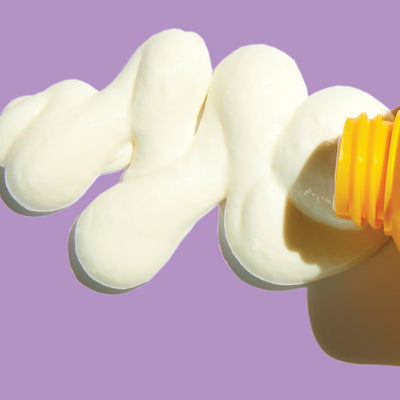You made a tiny human and now you’re basking in a glorious new-baby glow. HA! Of course you’re not. You’re wearing compression shorts to hold yourself together. You’re learning how to breastfeed and live on 5 minutes of sleep. Your new wailing roommate is making you feel completely out of your depth. And this is the moment your historically impeccable skin has decided to go rogue.
Here’s why: when you’re growing a small human inside your body, a whole bunch of hormones start flowing, leading to side effects like thick, luscious hair and that pregnancy glow. But, once your small human has made its way into the real world, those hormones take a hike (coupled with a serious lack of sleep and the fact you’ve instantly become a 24/7 milk bar).
It’s not a complete toddler-scale meltdown, but it’s likely you’ll face a few challenges post-birth, explains skin therapist Jocelyn Petroni. “Every skin type is so different, and we tend to find that women will see a combination of different things in their skin,” she says. Here’s a few of the delights that you might experience…
Breakouts
After you’ve had a baby, all the estrogen and progesterone that was surging around your body for nine months suddenly plummets, while other hormones like oxytocin – needed for breastfeeding and snuggling – start to rise. Spoiler: this roller-coaster ride doesn’t equal a clear complexion. “Hormones travel through the blood and the blood feeds the skin,” says Petroni, “so we do see the effect that hormones have on the skin, like breakouts.” It can manifest as regular acne, or you might score the sore, cystic kind of spots. It all sucks and we’re sorry.
Pigmentation
If you developed pigmentation – dark splotches around your lips, cheeks and forehead – during pregnancy, expect it to stick around for a while. “Hormones control the enzyme process that activates pigmentation, so we do see a lot of pigmentation or melasma in skin during pregnancy,” says Petroni. “This tends to fade a good few months after giving birth – even up to six months, pigmentation will still be fading.”
Dryness
Your baby is real cute, but it’s also stealing your glow. “If you’re breastfeeding, all the nutrients tend to go to the baby before they go to you, and last of all to your skin!” says Petroni. “This means skin can be dehydrated, dry and lacklustre, and it can start to show some of the nutrient loss that the body is experiencing.”
Sensitivity
Wondering why your normally well-behaved skin is suddenly freaking out over the slightest thing? Blame all of the above messing with your skin’s natural balance.
“If the acid mantle, that layer of oil and water that naturally protects the skin from the environment and pollution, becomes out of balance slightly, we are prone to our skin becoming sensitive or having a reaction to allergens,” explains Petroni. Hello, weird rashes and breakouts.
What to do
Employ a 10-step, twice-daily skin care regimen. (Kidding.) (You definitely don’t have time for that.) The key to getting your glow back is to keep skin care simple, says Petroni. “Use really basic products, nothing that’s going to strip the skin,” she suggests. “You want to build the skin’s oil and water balance up to make it stronger and healthier. That really simple way of treating the skin can have a knock-on effect to all these other ailments.”
Use a cleanser and apply moisturiser and sunscreen every day, she tips, then consider adding a gentle active like a lactic or salicylic acid exfoliant or serum to target pigmentation and congestion. “It will dissolve that surface dead, dry skin and very gently stimulate cell turnover that has started to slow down and become a bit dull. This in turn will help to clear breakouts and start to treat pigmentation as well.”
You will be looking (and feeling) like your usual cute self before you know it. Promise.




Comments